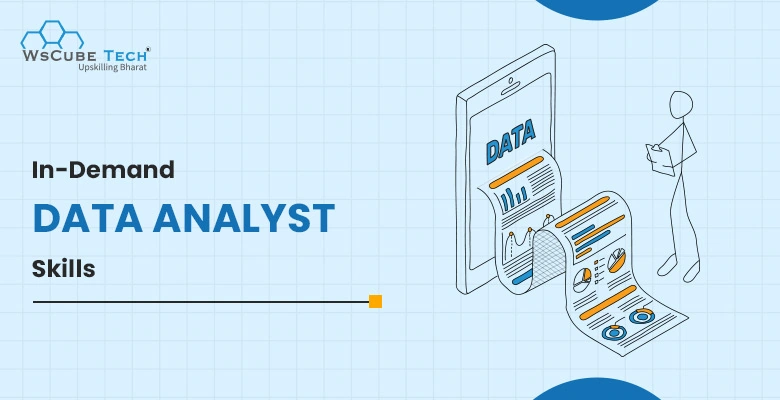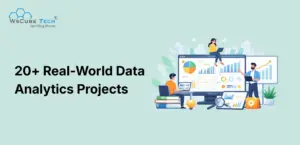Mastering diverse data analyst skills is crucial to excel as a data analyst in 2026. These skills define your effectiveness in the role and shape your career trajectory in the dynamic field of data analytics.
This blog explores the top data analyst skills required for freshers and seasoned professionals, offering insights into the skills needed to be a data analyst and how to cultivate the robust abilities necessary for a data analyst fresher. Let's delve into the essential skills of data analysts shaping the future of data-driven decision-making.
What is Data Analytics?
Data Analytics involves examining large datasets to uncover hidden patterns, correlations, and insights. It uses various tools and techniques to interpret data and make informed business decisions. Data analyst skills play a crucial role in this process, requiring proficiency in data analytics skills such as data mining, statistical analysis, and data visualization.
These skills help data analysts extract meaningful information from complex data sources, aiding businesses in understanding market trends, customer preferences, and operational efficiency. Whether you're an entry-level or experienced data analyst, mastering skills required for roles like programming languages, database management, and critical thinking is essential. In today's data-driven world, the demand for data analyst skills grows across industries, making it a promising career path for those passionate about numbers and insights.
Recommended Professional Certificates
Data Analytics Mentorship Program
Data Science & AI Mentorship Program
8 In-Demand Data Analyst Skills in 2026
Let’s have a look at the eight most sought-after data analyst skills you need in 2026 and beyond:
1. Data Analysis:
Data analysts interpret and analyze large datasets to uncover patterns, trends, and insights that support business decisions. They use statistical methods and tools to ensure accuracy and reliability in their findings. Strong data analysis skills involve querying databases, cleaning and organizing data, and applying analytical techniques to derive actionable conclusions.
2. Statistical Analysis:
This skill involves statistical methods like hypothesis testing, regression analysis, and correlation analysis to analyze data. Data analysts use these techniques to validate findings, make predictions, and understand relationships within datasets. Statistical analysis helps uncover meaningful patterns and trends that drive informed organisational decision-making.
3. Data Visualization:
Data analysts use visualization tools like Tableau, Power BI, or Python libraries (such as Matplotlib and Seaborn) to create visual representations of data. Charts, graphs, and dashboards present complex information in an understandable format. Effective data visualisation enhances the communication of insights, making it easier to grasp trends and make data-based decisions.
4. SQL Database Management:
SQL (Structured Query Language) is essential for data analysts to retrieve, manipulate, and manage data stored in relational databases. They write queries to extract specific datasets and perform joins, aggregations, and transformations. Proficiency in SQL enables data analysts to work efficiently with large volumes of data and ensure data integrity for accurate analysis.
5. Programming Skills:
Data analysts use programming languages like Python, R, or Java to automate data processes, perform advanced statistical analysis, and develop data-driven solutions. These languages facilitate data manipulation, machine learning model development, and integration with data sources, enhancing the depth and complexity of data analysis tasks.
6. Machine Learning:
Data analysts apply machine learning algorithms to analyse historical data, build predictive models, and optimise business processes. Understanding of machine learning concepts such as supervised and unsupervised learning, regression, and classification enables analysts to derive insights for forecasting trends and making data-driven recommendations.
7. Critical Thinking:
Critical thinking involves logically evaluating information, identifying patterns, and solving complex problems based on data analysis. Data analysts apply critical thinking skills to assess the validity of findings, draw meaningful conclusions, and propose actionable insights that effectively address business challenges.
8. Business Acumen:
Data analysts need a deep understanding of the industry and business context in which they operate. This skill enables them to interpret data findings about business objectives, identify opportunities for improvement or innovation, and communicate insights to stakeholders. Business acumen ensures data analysis efforts align with organizational goals and contribute to strategic decision-making.
These skills collectively equip data analysts to handle diverse datasets, extract valuable insights, and drive business success through informed decision-making.
Upcoming Masterclass
Attend our live classes led by experienced and desiccated instructors of Wscube Tech.
Tips For Learning Data Analyst Skills
Mastering data analysis involves developing a blend of core competencies. Here's how you can link essential skills to your learning journey:
1. Understand the Basics of Data Analysis
Use online and offline resources, enrol in a reliable data analyst course, and follow credible podcasts and tutorials to build strong foundational knowledge.
2. Master Necessary Tools
You can start with something basic like Excel to learn how to manipulate data and gradually learn advanced tools and languages, such as Python, SQL, R, Tableau, etc.
3. Take Classes and Seek Guidance
There are ample online courses available. WsCube Tech also offers a top-notch online data analyst course designed by experienced mentors and professionals. Take live classes from our dedicated trainers and kickstart your journey on a confident note.
4. Build Projects
You can build your own projects to apply your knowledge and skills and ask for feedback from your mentor. It will help you understand your weaknesses and strengths and move forward in the right direction.
5. Hone Skills Regularly
The data analytics world is evolving constantly and you must work on yourself to keep pace with it. Therefore, take time to acquire new skills regularly and stay ahead of your peers.
6. Learn From Mistakes
Throughout your career, you will make some mistakes. So do not ignore them; instead, learn from them. Take feedback and suggestions from seniors and work constantly to make yourself better everyday.
7. Join Internship
Whether it’s paid or free, an internship can work wonders to build your skills in the beginning while gaining hands-on experience. You get to work with top professionals and learn how the industry works, which can take you a long way.

How to Become a Data Analyst?
Becoming a data analyst involves mastering a set of essential skills required for success in this dynamic field. Here's a brief overview to get you started:
- Data Analyst Skills: Develop strong data analysts skills, such as data interpretation and statistical analysis, and proficiency in data visualization tools, such as Tableau or Power BI. Hone your data analytics skills by learning programming languages like SQL, Python, or R, which are essential for data manipulation and analysis.
- Database Analyst Skills: To handle large datasets efficiently, familiarise yourself with database analyst skills, including database management systems like MySQL or PostgreSQL.
- Technical Aptitude: Gain proficiency in Excel for data cleaning and analysis and familiarity with tools like Google Analytics for web data analysis.
- Problem-Solving Skills: Cultivate strong problem-solving abilities to interpret data trends, identify insights, and present actionable recommendations.
- Business Acumen: Understand business context and goals to effectively translate data insights into strategic decisions.
- Communication Skills: Master communication skills to convey complex findings clearly and persuasively to stakeholders.
- Continuous Learning: Stay updated with industry trends and advancements in data analytics to enhance your skills continuously.
By focusing on these critical areas and continuously improving your data analyst skill set, you can build a strong foundation for a promising career as a data analyst.
Also read: Data Scientist Roadmap: A Guide for Beginners
FAQs on Data Analysts Skills
Core data analyst skills include proficiency in statistical analysis, data visualisation, SQL, and programming languages like Python. Entry-level data analyst skills also emphasize strong analytical thinking and problem-solving abilities.
Freshers can develop data analyst skills by pursuing relevant educational courses, engaging in self-directed projects, or completing internships that allow hands-on practice. Building a skill set that includes both technical and soft skills is essential.
In 2026, the most sought-after data analytics skills include machine learning, advanced statistical techniques, big data handling, and expertise in data analysis tools like Tableau and Power BI.
Database analyst skills such as advanced SQL, database management, and optimization are crucial. These skills enable efficient data querying and management, which is essential for thorough data analysis.
Skills required for data analyst fresher positions typically include basic knowledge of data manipulation, understanding of statistical methods, proficiency in Excel, and foundational database skills. Strong communication and analytical thinking are also important.
Transitioning to a data analyst role from a non-IT field involves building foundational data analyst skills, such as learning SQL, Python, and data visualisation tools. Gaining certifications or completing relevant courses can accelerate this skill acquisition.
To advance your career, include advanced data analyst skills such as predictive analytics, machine learning, and deep knowledge of industry-specific data platforms. Continuous learning and specialization in data engineering or data science can also benefit.

Wrapping Up:
Mastering a diverse set of data analyst skills is essential to thrive in the dynamic field of data analytics. Whether starting as a data analyst or aiming to advance your career, proficiency in data analytics skills like statistical analysis, data visualization, and database management is paramount.
These data analyst skills enable you to extract meaningful insights from complex datasets, driving informed business decisions. Continuous learning and practical experience are key to staying competitive, while solid communication and problem-solving abilities ensure your findings resonate with stakeholders. Embrace these skills required for data analyst roles to forge a successful path in data-driven environments.
Join Our On-Campus Data Analytics Program




Leave a comment
Your email address will not be published. Required fields are marked *Comments (0)
No comments yet.